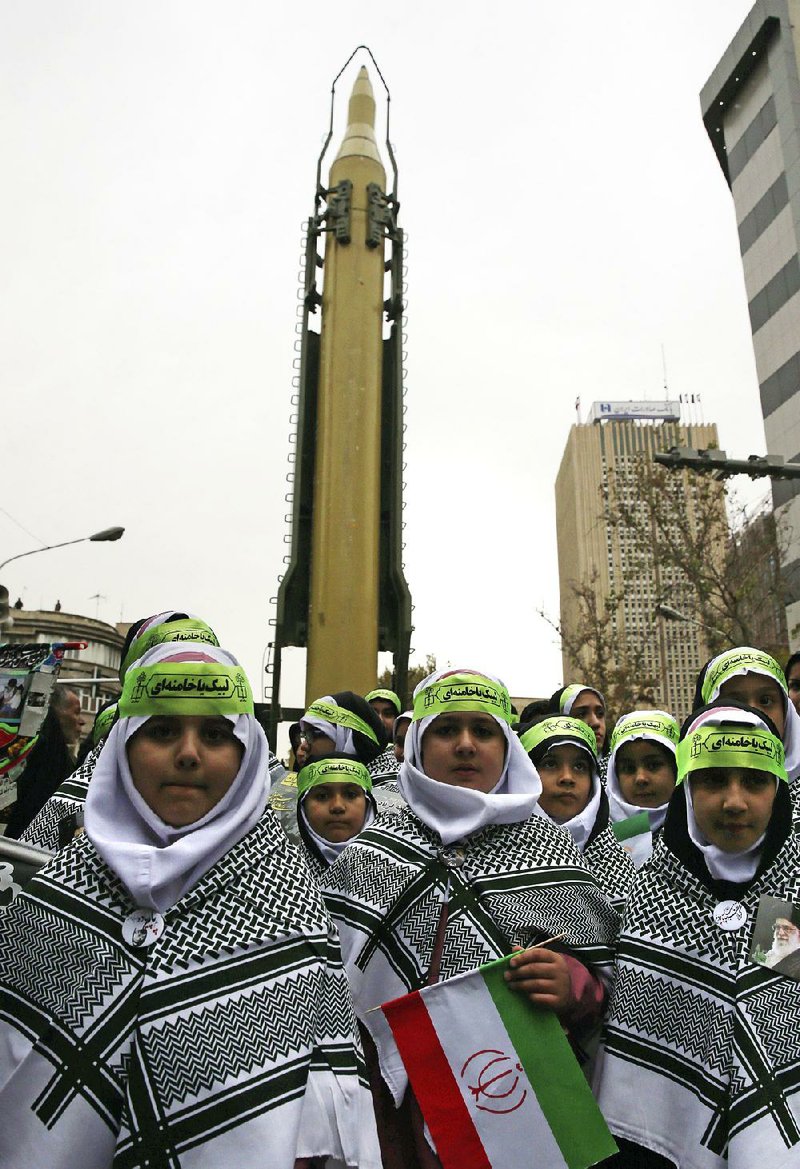TEHRAN, Iran -- Iran on Saturday held the heavily choreographed pageant of anti-Americanism that marks the anniversary of the 1979 takeover of the U.S. Embassy in Tehran as relations with President Donald Trump's administration worsen and the fate of its nuclear agreement with world powers is unresolved.
Thousands gathered on the campus of the former embassy, called a "den of espionage," where a ballistic missile was displayed. News agencies described it as a Sejil surface-to-surface missile with a range of 1,200 miles. It was the first time Iran displayed a missile during the annual gathering.
Later in the day, the semi-official Tasnim news agency, which has ties to the elite Revolutionary Guard, said the missile was a Qadr-F that has the same range as a Sejil.
Iran has paraded its missile capability in recent months in a show of defiance to Trump, whose administration has said Tehran's development of ballistic missiles violates the spirit of the nuclear agreement signed in 2015.
Last month, Trump declined to certify Iran's compliance with the agreement -- under which Iran curbed uranium enrichment in exchange for relief from international sanctions. Trump's decision did not undo the agreement, which European countries and Iran continue to support, but allows Congress to decide whether to reimpose certain sanctions against the Islamic Republic.
In 1979, hundreds of Iranian militant students took 52 Americans hostage at the embassy for 444 days to protest Washington's refusal to hand over the Western-backed shah, who was deposed in the 1979 Islamic Revolution. The U.S. cut its diplomatic relations with Iran after the embassy takeover and has had no diplomatic relations since.
Placards in Tehran reminded of U.S.-supported coups in Latin American and Asian countries.
Iran's commemorations took place under tight security managed by Iranian police and the Islamic Revolutionary Guard Corps.
A crowd chanted "Down with the U.S." and "Death to Israel" during the anniversary celebration. State TV said similar celebrations were being held in other Iranian cities and towns. They also burned flags of the U.S. and Israel, as well as an effigy of Trump.
Iranians who gathered at the embassy echoed the defiant words of Iran's supreme leader, Ayatollah Ali Khamenei, who last week called the United States Iran's "No. 1 enemy."
Ali Shamkhani, secretary of the country's Supreme National Security Council, addressed the crowd, saying Iran will make any sanctions imposed by the U.S. "ineffective" even as the U.S. targets Iran's economic, nuclear and defensive power.
Shamkhani, alluding to Trump's threats against North Korea, said even U.S. allies know that Trump "has no power to realize his bluffs, against Iran, too." He called the U.S. the "eternal enemy" of Iran.
Hasan Shorjeh, a retired teacher carrying a "Down with America" placard, said there was no point in respecting the nuclear deal if the United States doesn't hold up its end of the agreement.
"As the supreme leader said, American administrations have always been cunning and hostile, so I don't see any solution for the disputes," Shorjeh said. "The enmity with America will continue and our resistance will as well. I don't see any solution in my child's lifetime, let alone mine."
Beyond the celebrations, some Iranians expressed hope for better relations with the United States and opposition to the orchestrated anti-American protests.
"I wish the hostility between the two countries would end as soon as possible because we are suffering from it," said Hasan Mahmoudi, a shopkeeper near the embassy. "We want to have normal relations with America and foreign investment here to create jobs for our educated youth."
Information for this article was contributed by Ramin Mostaghim and Shashank Bengali of the Los Angeles Times and by Nasser Karimi of The Associated Press.
A Section on 11/05/2017
